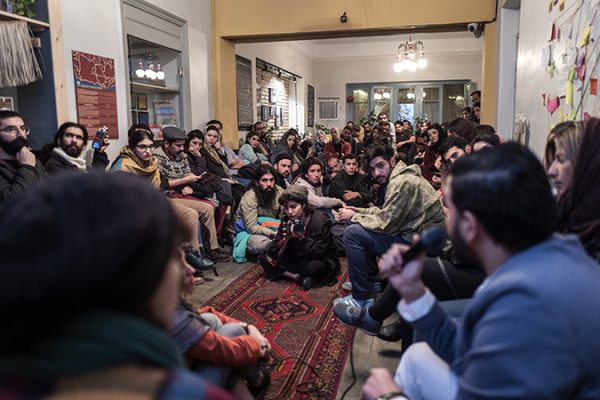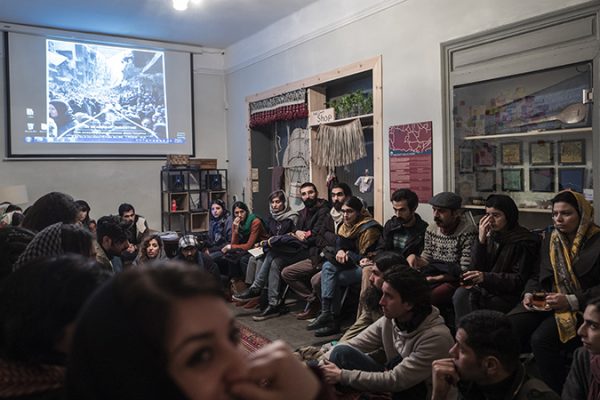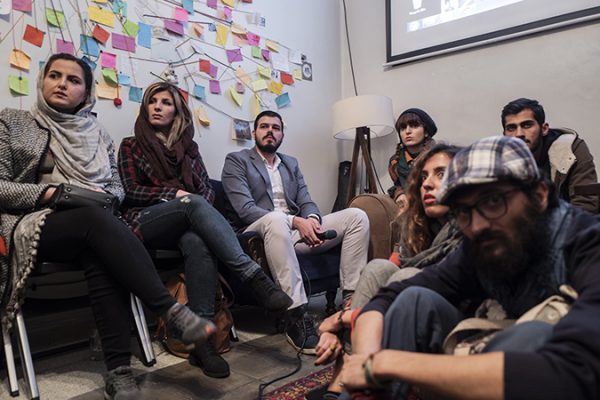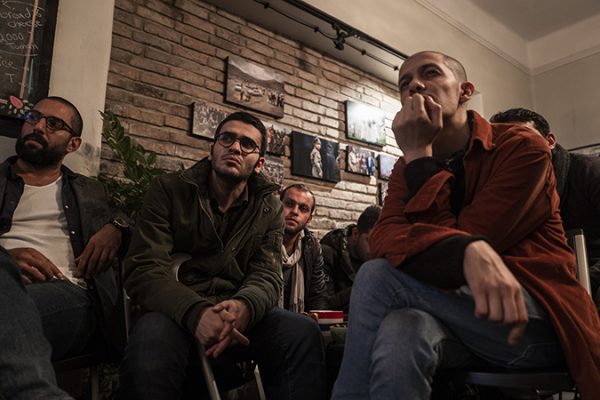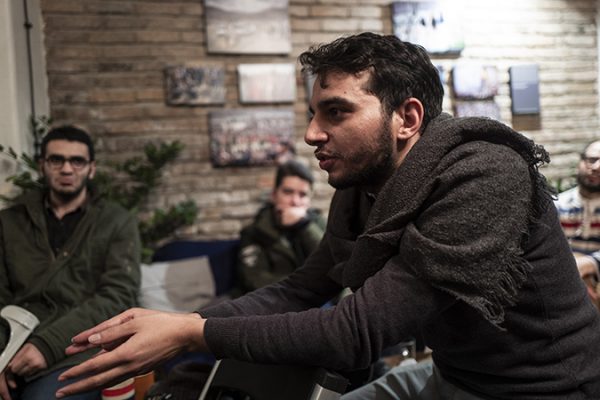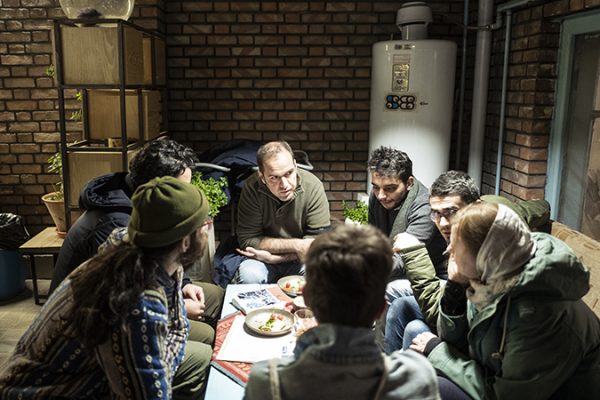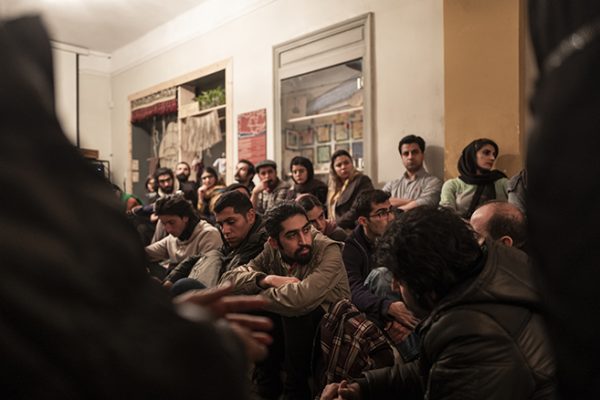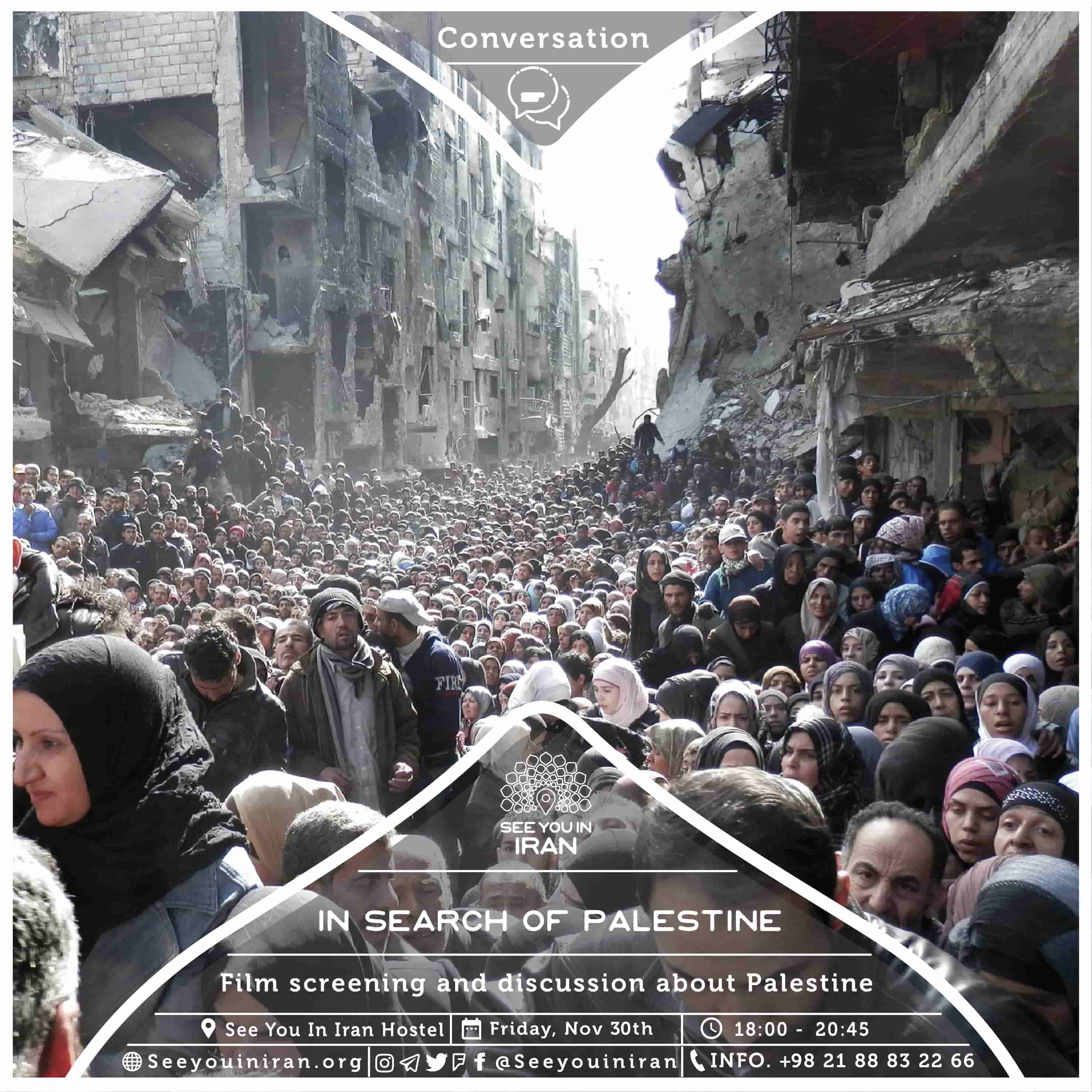In Search of Palestine
Movie Screening and Discussion about Palestine
On the second night of our migration event series, See You in Iran Cultural House organized a documentary film screening and discussion *-about Palestine. The film, “In Search of Palestine,” was made by the prominent post-colonial theorist and Palestinian immigrant Edward Said. In it he revisits the occupied territories with his son and talks to various civilians who have been affected by the 1948 exodus and suffered the circumstances thereafter. After the screening, third generation Palestinian immigrants led a dialogue wherein they demystified presumptions with fellow attendees.
One common misperception was regarding the rightful purchasing of land by Israeli Jews.. According to one of our guests, only 6% of the land has been lawfully transferred from Palestinian proprietor to Jewish owners. since Ottoman Empire ruled the region up to present day. It is worth to mention that around 2% was a gift from British forces to Zionist officials during the mandate. The criticism with regards to this argument is that no matter the percentage, the ownership of the land belongs to Palestine.
As for the outlook of the peace talks, the declarative law that was passed on July 2018 known as The Nationality Bill which, identifies Israel as a nation-state belonging only to the Jewish population illustrates the hostile approach which doesn’t encompass the existence of even two separate sovereign states. The last person to attempt to enact peace from the Israeli side was Yitzhak Rabin who was brutally assassinated by a radical Zionist after Oslo Accords.
One of the clauses of the Nationality Bill considers development of the Jewish settlements as a national value and intends to encourage its construction. These expansions are systematically designed to penetrate the Palestinian territories and act as barriers that separate the population. The settlements, according to one of our Palestinian guests, are then occupied by the Zionist fundamentalists that are completely intolerant of Palestinians. Ever since Oslo Accords recognized the Palestinian governance of West Bank and Gaza Strip, more than 40% of the West Bank has gone under construction for new settlements and around 800,000 occupants have moved into them.
The concept of resistance was brought up and how the Palestinians who have an Israeli citizenship can contribute to such movements. There are still 1.8 million Palestinians living in occupied territories for whom having Israel citizenship is compulsory but are not permitted to sell their lands to anyone but Jewish population. Notwithstanding the official discriminatory strains, this population has refused to move out of their righteous homes which, in its form is a resistance worth praising. Is a non-violent type of resistance applicable to the current situation? The broadcast of these so called “violent” acts by Palestinians is done by the extremely biased mainstream media which completely ignores the causes of such reactions in order to consolidate the idea that whoever dares to resist is part of a bloodthirsty group. A video of Norman Finkelstein was screened in which he challenges and expresses his disgust about politically motivated manipulation of Holocaust which by no means was an isolated genocidal incident during past century but has been portrayed as such by the media. West Bank has shrunk to half the area it was after the Oslo Accords established its governance by Palestinians. The living situation in Gaza Strip is abominable and close to a disaster however it has remained in size the same as it was before due to resistance groups that are labeled “terrorists”. Though movements such as BDS (Boycott, Divestment and Sanctions) have had a degree of success to support the suppressed voice of Palestinians, none of these means of resistance can survive and accomplish without the other.
In response to Palestinians tolerance towards the Jewish population, our guests clarified that Palestinian population consists of Jews, Christians and Muslims and they all lived in relative harmony in the past. The Zionists are the intolerants and it even manifests in their education system where they regenerate hatred towards Palestinians.
he indisputable fact is Palestinians are under constant suppression in various ways and are deprived of their most basic human rights. The mainstream media has a long history of distorting the facts and international community is oblivious towards the massacre and ethnic cleansing currently taking place in what used to be known as Palestine.
We at See You in Iran, as part of our immigration conversation series tried to create a space in which the personal narratives of third generation Palestinians can be heard. We hope such events can help us and our audience to form a better understanding of the situation and encourage activism to any extent.
در جستجوی فلسطین
پخش فیلم و تبادل نظر درباره مسئله فلسطین
۹ آذر دومین شب از برنامه های مهاجرت مجموعه See You in Iran با پخش مستند «در جستجوی فلسطینِ: ادوارد سعید به خانه بازمیگردد» برگزار شد. در این برنامه با دعوت از مهاجران نسل سوم فلسطینی که هماکنون ساکن ایراناند به بررسی ابعاد گوناگون مسئلهٔ فلسطین پرداختیم. در بخش اول رویداد، مستند «در جستجوی فلسطین» که روایت فلسطینی های متأثر از تبعید اجباری ۱۹۴۸ را به تصویر می کشد پخش شد. قسمت دوم به شنیدن نظرات مهاجران فلسطینی و دیگر شرکت کنندگان درباره زندگی روزمره، مقاومت، تلاش دولت اسرائیل در راندن فلسطینیان از مناطق اشغالی و سرزمین فلسطین و تاثیر رسانه های غالب در منحرف کردن افکار عمومی از فاجعه انسانی که در حال روی دادن است، اختصاص یافت.
در بخش بحث و تبادل نظر ابتدا باور رایج دربارهٔ خریدن قانونی زمین توسط اسرائیلی ها به بحث گذاشته شد. نکته مهم آن است که از زمان حکومت امپراتوری عثمانی تا به امروز تنها در حدود ۶ درصد از اراضی فلسطینی بهفروش رسیده است. همچنین لازم به ذکر است که ۲٪ از این اراضی در زمان تحت الحمایگی فلسطین از سوی دولت بریتانیا به سران صهیونیست اهدا شد.
موضوع مهم دیگر نیز دورنمای تاریک و ناامیدکننده صلح است. قانونی که اخیرا در اسرائیل به تصویب رسید مشخصا اسرائیل را مختص به یهودیان می داند و وجود فلسطینیان با گرایشات مذهبی دیگر را به رسمیت نمی شناسد. اسحاق رابین آخرین مقام رسمی اسرائیل که در پیشبرد مذاکرات صلح اسلو نقش کلیدی ایفا کرد توسط یک صهیونیست افراطی ترور شد. یکی از مفاد قانون مذکور ساختن شهرک های صهیونیست نشین را نوعی ارزش ملی میداند و ساختن چنین شهرک هایی را تشویق می کند. به گفتهٔ یکی از مهاجران شرکت کننده در برنامه، ساختن این شهرک ها که عموما محل اقامت صهیونیست های افراطی می شوند با هدف جداسازی و تحت فشار قراردادن جمعیت فلسطینی انجام می شود. پس از موافقتنامهٔ اسلو که با به رسمیت شناختن دولت مستقل فلسطینی در ادارهٔ کرانه باختری و نوار غزه همراه شد نزدیک به ۴۰ درصد از مساحت کرانه باختری به شهرکهای یهودی نشین تبدیل شده و قریب به ۸۰۰،۰۰۰ نفر اسرائیلی به این شهرک ها نقل مکان کرده اند.
دربارهٔ مقولهٔ مقاومت و نقش فلسطینیانی دارای گذرنامهٔ اسرائیلیاند در پیشبرد جنبشهای مقاومت دارند، به اجبار این افراد از سوی دولت اسرائیل به گرفتن گذرنامه اشاره شد. با وجود تمام تبعیض های موجود در قبال ساکنان فلسطینی اراضی اشغالی و فشارهایی که از طرف دولت اسرائیل برای واگذاری زمین هایشان به یهودیان وارد می آید، آن ها با چنگ زدن به گذشته و هویتشان در مقابل این مصائب ایستادگی کرده و امید به آینده را حفظ می کنند. اما آیا مفهوم مقاومت را می توان به مجموعه ای از تقابل های خشونت آمیز تقلیل داد؟ نکته مهم آن است که نقش پررنگ رسانه در این تصویرسازی را نمی توان نادیده گرفت. نگرش یکسویهٔ رسانه های غالب که در خدمت اهداف دولت-ملت هایی هستند که به طرق گوناگون از بحران در خاورمیانه و بهویژه فلسطین منتفع می شوند، موجب شده به هرگونه مقاومت از سوی فلسطینیها برچسب خشونت زده شود. نرمن فینکلشتاین که از منتقدان جدی سیاست های ضدانسانی دولت اسرائیل است، در کلیپی که در بخش دوم برنامه پخش شد، بهشدت از استفادهٔ سیاسی از هولوکاست انتقاد می کند. وی بر نقش رسانهها در بازنمایی جانبدارانه از این نسلکشی بهعنوان تنها نسلکشی با اهمیت قرن گذشته تاکید کرده و از چشمپوشی رسانهها از دیگر جنایات مشابه در سرتاسر جهان و مشروعیت سیاسی که به تبعات انسانی هولوکاست بهویژه در فلسطین اشغالی میدهند انتقاد میکند. این انتقاد به نقش رسانهها برای مثال در این موضوع روشن میشود که وسعت منطقهای که بر اساس توافقنامه اسلو تحت اداره حکومت خودگردان فلسطین در کرانهٔ باختری قرار گرفت، به نصف کاهش پیدا کرده، درحالیکه نوار غزه با وجود شرایط نامطلوب و بهشدت غیرانسانی زندگی در آن بهخاطر وجود گروه هایی که در رسانه ها به عنوان تروریست شناخته میشوند تمامیت خود را حفظ کرده است. در این میان وجود جنبش هایی مانند BDS به قدرت مقاومت می افزایند اما این هم افزایی بدون وجود روش های متنوع مقاومت پایدار نخواهند بود.
با اشاره به این نکته که جمعیت فلسطینی شامل اقلیت های مذهبی گوناگونی از جمله مسلمانان، مسیحیان و یهودیان می باشد، یکی از مهمانان متذکر شد که فلسطینیان تضادی در همزیستی با یهودیان ندارند و در عوض همواره صهیونیست ها به علت دیدگاه های افراطی شان حاضر به پذیرفتن وجود فلسطینیان نیستند.
حقیقت غیرقابل انکار این است که فلسطینیان سال هاست تحت سرکوب رژیمی هستند که آنها را از حقوق اولیه انسانیشان محروم کرده و این امر تحت حمایت رسانه ها و جامعهٔ بین المللی منفعل نسبت به این نسل کشی و شرایط غیر انسانی، انجام پذیرفته است.
در مجموعهٔ See You in Iran و در شب دوم سری رویدادهایی با محوریت موضوع مهاجرت، سعی کردیم فضایی فراهم کنیم که در آن روایتهای شخصی و تجربیات نسل سوم مهاجران فلسطینی شنیده شود و در کنار هم به درک بهتری از مسئله فلسطین برسیم.
What to Expect
See You in Iran Cultural House, in the second part of a conservation series focusing on immigration, is screening “In Search of Palestine” which is a documentary made by Edward Said. Said was a Palestinian American literary theorist and public intellectual who helped found the critical-theory field of post colonialism. “In Search of Palestine” explores issues such as settlements expansion, growing apartheid system, segregation within the Israeli state and ongoing ethnic cleansing of Palestinians within the occupied territories. The second part of the event will be a conversation/discussion about Palestine with the presence of third generation Palestinian refugees and individuals who have researched the topic. We invite anyone who is interested in migration and Palestine to join us at the See You in Iran Hostel in Tehran this Friday Nov., the 30th at 6:00 pm.
در دومین شب از رویدادهای مهاجرت تصمیم گرفتیم با نمایش فیلم مستند ”در جستجوی فلسطین” از ادوارد سعید، در خانه فرهنگی See You in Iran به مسئله فلسطین بپردازیم. در این فیلم سعید به موضوعاتی از قبیل پاکسازی قومیتی، گسترش مناطق اشغالی و جداسازی و نابرابری نژادی در اسرائیل میپردازد. در بخش دوم برنامه به بحث و تبادل نظر درباره فلسطین خواهیم پرداخت. برای این رویداد از مهمانانی که در زمینه فلسطین تحقیق یا فعالیت کردهاند و از نسل سوم مهاجرین فلسطینی که ساکن ایران هستند دعوت کردیم تا ما را همراهی کنند. اگر علاقمند به شرکت در این برنامه هستید یا تجربهای در این زمینه دارید، از شما دعوت میکنیم روز جمعه نه آذر، ساعت ۶ عصر، در کنار ما باشید.

